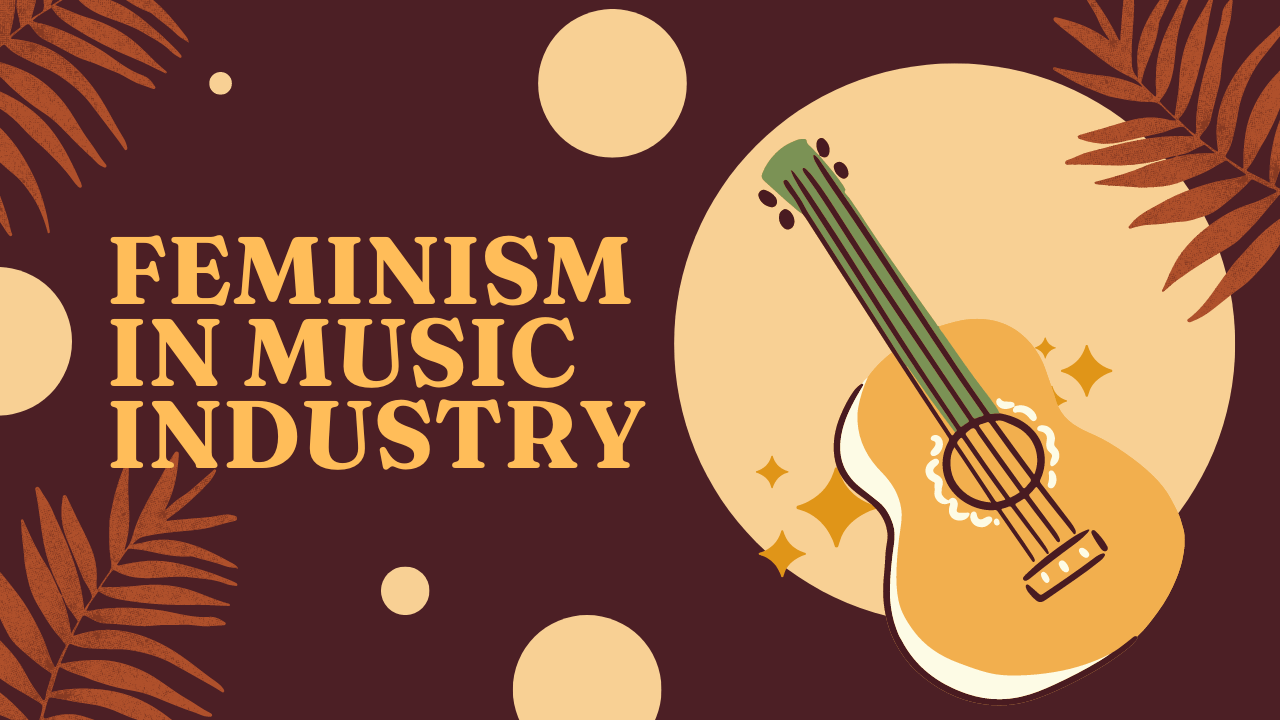The music industry has long been dominated by men. Women have faced many challenges, including unequal pay and limited roles in leadership. But feminism in the music industry is slowly bringing change. This blog explores how feminism is reshaping the music industry, highlighting the challenges, achievements, and future paths for women.
The Historical Context of Feminism in the Music Industry
Early Struggles for Women in Music
To understand feminism in the music industry, we need to look at the past. For many years, the industry sidelined female artists. Their contributions often went unnoticed because male artists overshadowed them. People saw women mainly as performers, not as creators or decision-makers. Their talents were often judged by their looks rather than their skills.
In the early 20th century, women began to make strides in genres like jazz and blues. Icons like Billie Holiday and Ella Fitzgerald broke barriers. However, even these successful women faced significant challenges. They often received less pay and recognition compared to men. Their success was more the exception than the rule.
The Rise of Female Artists in the 1960s and 70s
As time went on, women began to play bigger roles in music. The 1960s and 70s saw the rise of powerful female artists like Aretha Franklin and Janis Joplin. These women dominated the charts and became symbols of empowerment. Yet, men still controlled the music industry. Women were often confined to specific genres or roles seen as “appropriate” for them.
The Role of Feminism in Shaping Modern Music
Feminism Challenges the Norms
Feminism has played a crucial role in changing outdated norms in the music industry. Starting in the 1960s, feminist movements began to challenge male-dominated structures. These movements encouraged women to take control of their careers and demand equal opportunities.
For example, punk rock saw bands like The Slits and Bikini Kill address issues like sexism through their music. The Riot Grrrl movement of the 1990s also used music as a platform for feminist activism. These movements gave women a voice to fight for change.
Influence of Feminism on Popular Music
Feminism’s influence also reached mainstream music. Artists like Madonna challenged societal norms and empowered women to express themselves freely. In recent years, feminism has become even more visible in the music industry. Social media has allowed women to control their image and music, bypassing traditional industry gatekeepers.
Beyoncé, Taylor Swift, and Rihanna are examples of artists using their platforms to promote feminist ideals. Beyoncé’s 2013 album, featuring a speech by Chimamanda Ngozi Adichie, is often seen as a key moment where feminism intersected with mainstream music.
Challenges Faced by Women in the Music Industry
The Gender Pay Gap
Despite progress, women in the music industry still face many challenges. One major issue is the gender pay gap. Women often earn less than their male counterparts, even when they have similar roles. This pay gap reflects the broader inequality in many industries. However, it is particularly evident in music, where people often undervalue women’s contributions.
Underrepresentation in Leadership Roles
Another challenge is the lack of women in leadership roles. Although there has been some progress, women remain underrepresented in executive positions at record labels and music platforms. This lack of representation limits their influence on decision-making processes and perpetuates gender inequality.
Sexual harassment and discrimination also remain widespread issues. The #MeToo movement highlighted many cases of sexual misconduct in the music industry. These problems persist, showing that much work remains to be done.
Pressure to Conform to Stereotypes
Women in the music industry often face pressure to fit certain stereotypes. People frequently expect female artists to conform to roles like the “sexy pop star” or the “rebellious rocker.” This limits their creative freedom and boxes them into narrow categories.
Ageism also affects women more than men in the industry. While male musicians can enjoy long careers, women often face pressure to maintain a youthful image or risk losing the spotlight as they age.
Success Stories: Women Who Have Broken Barriers
Beyoncé and Female Empowerment
Despite these challenges, many women have broken barriers in the music industry. Beyoncé is a prime example. She has become a symbol of female empowerment, using her music and public persona to advocate for gender equality. Her success has inspired countless women to pursue music careers and use their platforms to promote feminist ideals.
Beyoncé’s self-titled album in 2013, which featured a speech on feminism, is often cited as a significant moment in mainstream music’s embrace of feminist ideas.
Taylor Swift’s Fight for Artists’ Rights
Taylor Swift is another trailblazer. She has fought for artists’ rights and highlighted unfair industry practices that often affect women. Swift’s decision to re-record her old albums to regain control of her music rights sent a powerful message about the importance of artists owning their work.
Women in Music Production and Journalism
Women like Sylvia Massy and Linda Perry have made significant contributions to music production, a field still dominated by men. Massy, known for her work with bands like Tool, has been a vocal advocate for women in production. Perry, a successful songwriter and producer, has mentored and supported young female musicians.
Women have also made strides in music journalism, challenging male-dominated narratives. Writers like Ann Powers and Jessica Hopper have brought feminist perspectives to music criticism, providing greater visibility for female artists.
The Role of Feminism in Promoting Diversity and Inclusion
Intersectionality in Feminism
Feminism in the music industry is about more than just women’s rights. It’s also about promoting diversity and inclusion. Feminism recognizes that gender inequality intersects with other forms of discrimination, such as racism and homophobia. This has led to a push for a more inclusive music industry.
The success of artists like Lizzo and Janelle Monáe has challenged traditional ideas about beauty and femininity. These artists have used their platforms to celebrate body positivity and queer identity, making the industry more inclusive.
Lizzo and Body Positivity
Lizzo has become a strong advocate for body positivity and self-love. Her music challenges the industry’s narrow beauty standards, promoting inclusivity and acceptance. Lizzo’s success has paved the way for other plus-sized women in music and sparked conversations about representation.
Janelle Monáe and Queer Identity
Janelle Monáe has used her music to challenge norms around gender and sexuality. Her album “Dirty Computer” explores themes of queerness, race, and identity. Monáe’s work shows the power of music as a tool for social change and the importance of diverse voices in the industry.
Feminism and the Future of the Music Industry
The Rise of Independent Artists
The future of feminism in the music industry looks promising, but challenges remain. As the industry evolves, feminist principles must stay central in discussions about equality and inclusion.
The rise of independent artists and digital platforms is one area where feminism can have a significant impact. Social media and streaming services give artists more control over their careers. This shift has the potential to democratize the industry, allowing more women and marginalized groups to succeed on their own terms.
Challenges of Algorithmic Bias
However, it’s crucial that these platforms uphold feminist values and address existing biases. Issues like algorithmic discrimination must be tackled. Female artists may be less likely to be recommended by streaming services due to gender biases in the algorithms.
Feminism’s influence is also visible in how more artists are speaking out on social issues. From climate change to racial justice, musicians are using their music and influence to advocate for change. This trend is likely to continue, with feminism playing a central role.
How the Industry Can Support Feminism
Closing the Gender Pay Gap
For feminism in the music industry to continue making progress, the industry must support these efforts. This can be done by implementing policies that promote gender equality and providing resources and mentorship for women in music.
Record labels, streaming platforms, and other industry bodies need to take proactive steps to close the gender pay gap. Ensuring equal opportunities for women at all levels is essential. Hiring more women in leadership roles and creating safe work environments will also help achieve this goal.
Promoting Education and Awareness
Education and awareness are key to changing attitudes within the industry. Industry professionals should be educated about the importance of gender equality and the role of feminism. This will help create a more supportive environment for women.
Mentorship programs can also make a big difference. By connecting young female artists and professionals with experienced mentors, the industry can help foster the next generation of women leaders in music.
Amplifying Diverse Voices
The industry can support feminism by amplifying the voices of women and marginalized groups. This can be done by promoting diverse artists and ensuring equal representation on playlists and at music festivals. Providing platforms for women to share their stories will help create a more inclusive music culture.
Conclusion: The Power of Feminism in the Music Industry
Feminism in the music industry has driven change and challenged the status quo. While there is still much work to be done, the progress made so far shows the power of feminist movements and the resilience of women in the industry.
As we move forward, the industry must continue to embrace feminism. Working towards a future where gender equality is the norm will create a more vibrant, innovative, and equitable space for all. Feminism in the music industry is not just about equality for women; it’s about creating a more just and inclusive world for everyone. Together, we can ensure that the music industry becomes a place where talent and creativity are recognized and rewarded, regardless of gender.
For further reading, explore these related articles:
- How to Get Into the Music Industry as a Singer: A Complete Guide
- The Evolution and Impact of the Hollywood Music Industry
- Racism in the Music Industry: An In-Depth Analysis
For additional resources on music marketing and distribution, visit Deliver My Tune.





